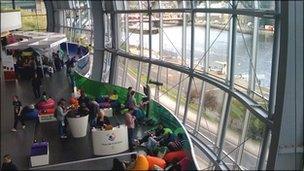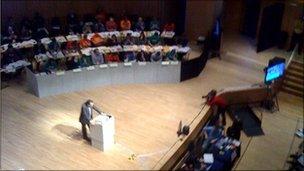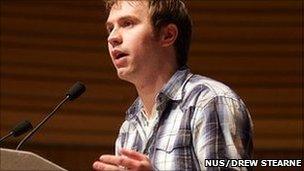Twitter, Glee and moderates rule at NUS conference
- Published

The conference resembled a hi-tech gathering with delegates blogging and Tweeting from laptops
What a difference a year makes.
When members of the National Union of Students were electing their new president this time last year, it was in the heat of the general election campaign.
The students' best friend, a certain Nick Clegg, sent a video message to the conference pledging to vote against any raising of the upper limit on tuition fees.
Like a rather quaint relic of former times, the video is still there on the NUS annual conference page.
This year, in the light-filled halls of the Sage Centre in Gateshead, students had a message from another Liberal Democrat.
Olive branch
This time it was former MP and NUS activist, Lembit Opik. Even he couldn't resist telling the audience not to be cheeky.
But he came bearing not jungle palms but an olive branch. Talking of the shame he felt for how the Lib Dems had let down students over tuition fees, he offered his services to student unions wanting to rebuild links with the grassroots of his party.
He accused his party leaders of making sanctimonious promises to students before the election and then letting them down.
As if it hasn't been bad enough becoming the biggest student hate figure for decades, Mr Clegg now faces the prospect of Lembit Opik taking the moral high ground over him.

Speeches were passionate, but listened to with mutual respect
Anyone expecting this conference to be a continuation of student riots by other means would have been badly disappointed.
Interest in student politics has been raised by the dramatic street protests and occupations, but this wasn't any kind of rant-fest.
Speeches were strongly felt and articulate, and listened to with plenty of mutual respect.
And, even after a year of unprecedented activism, it was the more moderate centre-left wing of student politics which has emerged as stronger in the NUS than the radical fringes.
There were passionate speeches calling to take the protest back to the streets, but that wasn't the way that the votes were going.
The winning presidential candidate, Liam Burns, describes himself as centre left.
Although he called for more local protests, and "civil disobedience" such as sit-ins and occupations, a proposal to stage another national protest in the autumn was rejected.
There might well be further national demonstrations, but as one representative put it, they didn't want to "fetishise" the idea of protest.
Twittering epicentre
And forget any stereotypes about student grunge. Anyone wandering into this elegant Tyneside setting might have thought they were wandering into some kind of hi-tech industry conference.

Liam Burns, currently president of the NUS in Scotland, was elected as the new NUS president
This was a Twittering epicentre. Everything that moved got blogged - and often really well - in what might be called a laptopcracy.
There was the usual range of campaign stalls with leaflets and stickers, but the most prominent display was from the mobile phone company that sponsored the event.
Even if university isn't free any more, there is still the prospect of occasional free wi-fi.
There was even an outbreak of Glee-style dancing.
Supporters of candidates have been wearing campaign T-shirts around the conference and a block of these delegates formed an alarmingly well-organised song and dance group.
There has been much talk this year of the return of 1960s-style student radicalism.
And this has been an extraordinary year for student politics. No one could have anticipated the wave of protests, riots and occupations.
But this is a different type of politics. It's image-aware, tuned into its own technology, and capable of innovative campaigning.
And by the looks of this conference, it's not so much Street Fighting Man as Dancing in the Street.